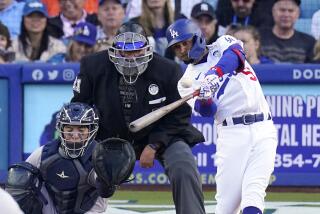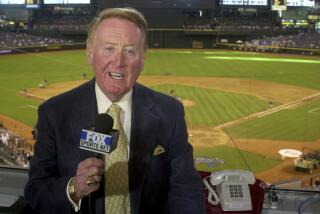New country for old man with Dodgers
Looking for power and a veteran presence to spark a promising young team, the Dodgers found both in a slugging outfielder who’d worn out his welcome at his previous stop.
So successful and charismatic was the newcomer, plucked in a trade, that L.A. fans took an immediate liking to him.
A section of the bleachers was named in his honor.
Manny Ramirez?
He was still in diapers.
It was 1974 and the object of the fans’ affections, the honorary mayor of “Cannon Country,” was a 5-foot-9, 165-pound center fielder named Jimmy “The Toy Cannon” Wynn.
“Manny is a lot more controversial than I was,” Wynn says, chuckling at the comparison, “but I do see a whole lot of similarities between Mannywood and Cannon Country.”
Like Ramirez, Wynn escaped a toxic situation when he joined the Dodgers. And he too flourished in his new surroundings, putting together probably the greatest all-around season of his career and delivering on a spring training promise to management that the Dodgers would reach the World Series.
“I knew I wasn’t finished,” he says.
Acquired from the Houston Astros in December 1973 after batting only .220 in his final season with the Astros, Wynn batted .271 in his first with the Dodgers at age 32. He hit 32 home runs with 108 runs batted in, nearly doubling his RBI total from the previous season, and was the National League comeback player of the year. In voting for most valuable player, he finished fifth.
Along the way, adoring fans in the left-field pavilion opened their hearts to the diminutive power source.
“It all started with one lady,” Wynn, 67, says from his home outside Houston. “Her name was Miss Frances [Friedman]. She was a Latin American lady who came to the ballpark every day. I made it a point to say hello to her and the other fans out there and to throw baseballs up to them -- all the things that a ballplayer should do for fans who appreciate what he’s done.
“Lo and behold, I ran out there one day and saw a sign saying ‘Cannon Country.’ I tell you, it made me feel good. I don’t think anything like that had ever happened at Dodger Stadium.”
Wynn had played his first 11 seasons in Houston -- in 2005, the Astros retired his number -- and didn’t want to leave.
“But I think my time was up,” he says. “I was getting booed a lot because I wasn’t performing as well as I should have, and I think it was good for me, really, to get traded. I was reborn, you might say. It was a fresh start, and I loved every moment of it.”
Especially enjoyable for Wynn was his grand slam 35 years ago this week in a victory over the Cincinnati Reds, perhaps the most significant hit of the season for the National League champions.
The hard-charging Reds, who’d overcome a large early deficit to take the division title from the Dodgers in 1973, had closed to within 1 1/2 games of their division-leading rivals in 1974 by taking the first two games of a three-game series at Dodger Stadium.
In the series finale, with the Dodgers clinging to a 2-1 lead in the seventh inning, Wynn delivered his blow.
“That changed the whole thing for us,” says Wynn, who these days works as an Astros’ broadcaster, advises at-risk kids to stay off drugs and visits U.S. military bases to thank soldiers for serving their country. “The Reds were nipping at our tails and when I hit that grand slam, that kind of took the puff out of their sails.”
The Dodgers, also featuring MVP Steve Garvey and Cy Young Award winner Mike Marshall, won 102 games, ousted the Pittsburgh Pirates in the National League playoffs and reached the World Series, where they lost to the Oakland Athletics.
Unfortunately for Wynn, an elbow injury suffered about a week before his grand slam limited his effectiveness in late September and October and eventually cut short his career.
Traded to the Atlanta Braves after the 1975 season in a deal that brought Dusty Baker to the Dodgers (and spawned a cheering section known as “Bakersfield”), Wynn retired in 1977 with a .250 lifetime batting average, 291 home runs and 964 RBIs.
His power numbers were especially impressive because the undersized slugger played the majority of his career in two of the toughest ballparks in baseball history to hit a home run in -- the Astrodome and Dodger Stadium.
A Houston sportswriter, John Wilson, dubbed Wynn the Toy Cannon, Jim Murray once noted, “because pitchers who expected to be hit with a cork with a string on it suddenly found an 88-millimeter howitzer opening up on them.”
Playing in the Astrodome all those years, Wynn speculates, may have cost him as many as 100 home runs.
But he can live with that.
He’s just thankful he made good on that 1974 promise.
“When I got down to spring training that year,” Wynn says of his introduction to the Dodgers, “the O’Malleys called me in and told me why they wanted me there, that they wanted a leader. The conversation went on and I opened my mouth and told them I would guarantee them that we would win the pennant.
“Later, I went back to my room, looked at myself in the mirror and said, ‘Why did you say something like that, you dummy?’ ”
Winning, he could envision.
Cannon Country, he says, was an unexpected bonus.
--
More to Read
Are you a true-blue fan?
Get our Dodgers Dugout newsletter for insights, news and much more.
You may occasionally receive promotional content from the Los Angeles Times.






